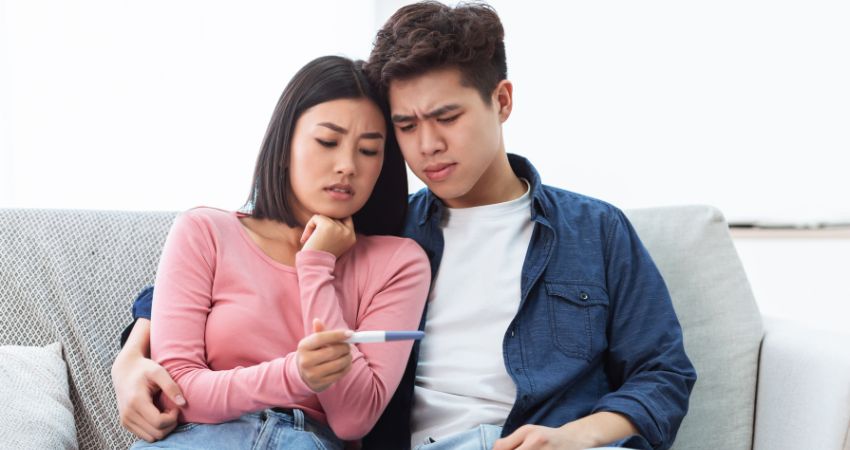The longer you wait, the more reliable the test outcome will be. Testing too early risks getting an inaccurate negative result. Early testing risks inaccurate results. How Soon After Unprotected Sex Can I Test for Pregnancy
- 14 to 16 days after intercourse or conception: At this point, home pregnancy tests are over 99 per cent accurate when used properly. Waiting 2-3 weeks allows enough time for hCG levels to rise to be detectable in a test.
- When the period is late: If you miss your expected period altogether, almost all pregnancy tests will give an accurate result at this point. The heightened pregnancy hormone levels can be detected when menstruation doesn’t occur on schedule.
Let’s look more closely at timeline ranges: How Soon After Unprotected Sex Can I Test for Pregnancy?
Earliest Detection
Some very sensitive pregnancy tests claim they can yield positive results as early as 6 days past ovulation or about 8 to 10 days after conception in very early pregnancy. Most experts recommend waiting until 14 days after intercourse or conception. The levels of hCG have risen high enough at that point to trigger accurate test readings.
Most Accurate Time Frames
By 14 to 16 days after intercourse or conception, home pregnancy tests are over 99 percent accurate when used properly. So for the highest accuracy, waiting 2 to 3 weeks is recommended.
Also, when testing after a missed period, almost all pregnancy tests will be accurate. So if you don’t get your normal period when expected, then that’s a good time for testing.
Why the Wait for Accurate Results
The reason for waiting to take a pregnancy test is those rising hCG levels. Blood and urine hCG levels double approximately every 48 hours in early normal pregnancy. The longer you wait after intercourse or conception, the higher they’ll be if you have an implanted embryo. That makes test results more accurate.
Testing too early means less hCG in your body. Depending on test brand sensitivity, a positive result would require high enough hCG levels your body may not have produced yet. That could yield a false negative result.
While many tests promise early accurate results, experts still recommend waiting until you’ve missed your period. By then, the steadily multiplying hormonal signals of pregnancy register clearly on test stick dip strips or in blood tests.
What If I Test Too Soon?
If trying to test very early, negative results when levels aren’t high enough yet may simply mean it’s still too soon after sex to tell definitively if conception occurred or not. Retest a week later if still unsure.
Early positive results are almost certainly accurate if it’s more than a faint line colour indicating “pregnant.” Today’s tests rarely yield false positives. Still, retest within a few days if early results surprise you since some rare medical conditions could skew results.
Key Points for Testing After Unprotected Sex
Here are some key points to remember when taking an at-home pregnancy test or seeing your doctor for blood testing:
- Use first-morning urine when your hCG levels are most concentrated.
- Don’t drink too many liquids right before testing or it dilutes urine.
- Read and follow all test directions to avoid handling errors.
- Look closely for even faint test lines that indicate a positive.
- Retest a few days later if still uncertain.
- See your doctor for a blood test for the highest accuracy anytime.
What If My Period Is Late?
Once you’ve missed your normal period, almost all tests will accurately detect existing pregnancy from heightened hormones by then. Testing when a period doesn’t arrive on schedule makes results near foolproof no matter your cycle lengths.
Can I Still Have Normal Periods If Pregnant?
Rarely, light monthly bleeding happens during early pregnancies and gets mistaken for a period. So yes, if you had intercourse that might have led to conception within the prior month, take a test when in doubt.
Impact of Cycle Lengths
The typical woman’s cycle lasts about 28 days, counting from the start of one period to the next. Ovulation happens around mid-cycle, about day 14. Know that cycles often vary substantially in normal women, lasting between 21 to 35 days.
If you have long, irregular cycles, ovulation isn’t easy to pinpoint. Have sex more than once around your usual mid-cycle timing to increase the odds of conceiving during that fertilizable window.
When uncertain of the usual timing for ovulation and period start, figure out your average cycle lengths over the prior six months. Then use a calendar starting from the first days of the last menstrual period to estimate the timing of possible implantation by counting forward 12 to 16 days after ovulation may have occurred. That’s the soonest pregnancy test that could be accurate after exposure.
Increase Accuracy with Early Testing
Because even the most sensitive pregnancy tests can yield uncertain very early results, consider these tips:
- Retest a few days later if negative but take the test fewer than 10 days after sex during fertile times.
- If positive but uncertain because tested very early, retest in 48 hours to see if still positive with darker line color.
- Get blood tests at your doctor’s office for the highest accuracy anytime instead of urine tests.
Early Signs of Conception Besides Positive Tests
Some women notice early signs and symptoms in their body indicating possible pregnancy:
- Implantation bleeding/spotting
- Breast tenderness
- Nausea
- Increased urination
- Food aversions/cravings
- Fatigue
- Bloating
While promising, none of those bodily changes guarantee that conception or pregnancy happened, just like negative early tests don’t guarantee you don’t have an implanted embryo. Testing when a period is late or waiting a full 14 to 21 days after sex avoids uncertainty.
Boost Your Chances
To optimize opportunities for conception so any positive test indicates a true pregnancy:
- Have well-timed intercourse every two to three days during the fertile period.
- Use an ovulation predictor kit for best fertility timing.
- See your doctor for a preconception checkup and prenatal vitamins.
- Have a partner’s sperm count tested if over age 35.
- Maintain a fertility-friendly weight, diet and lifestyle.
The Takeaway
While it’s tempting to take a pregnancy test ASAP, most brands require 10 to 14 days after intercourse or conception to give accurate results. Using concentrated early morning urine, retesting uncertain early results, and knowing your cycles all facilitate accuracy. Once the period is late, almost all tests give reliable positive or negative pregnancy readings. Patience pays when testing after unprotected sex. Knowing the best timing prevents false interpretations so you know your true status.







